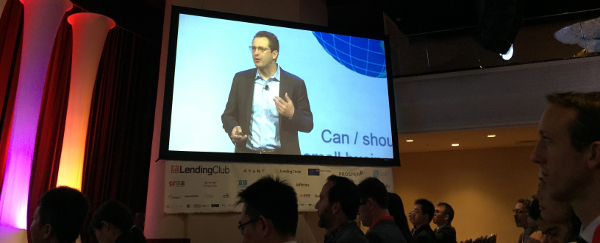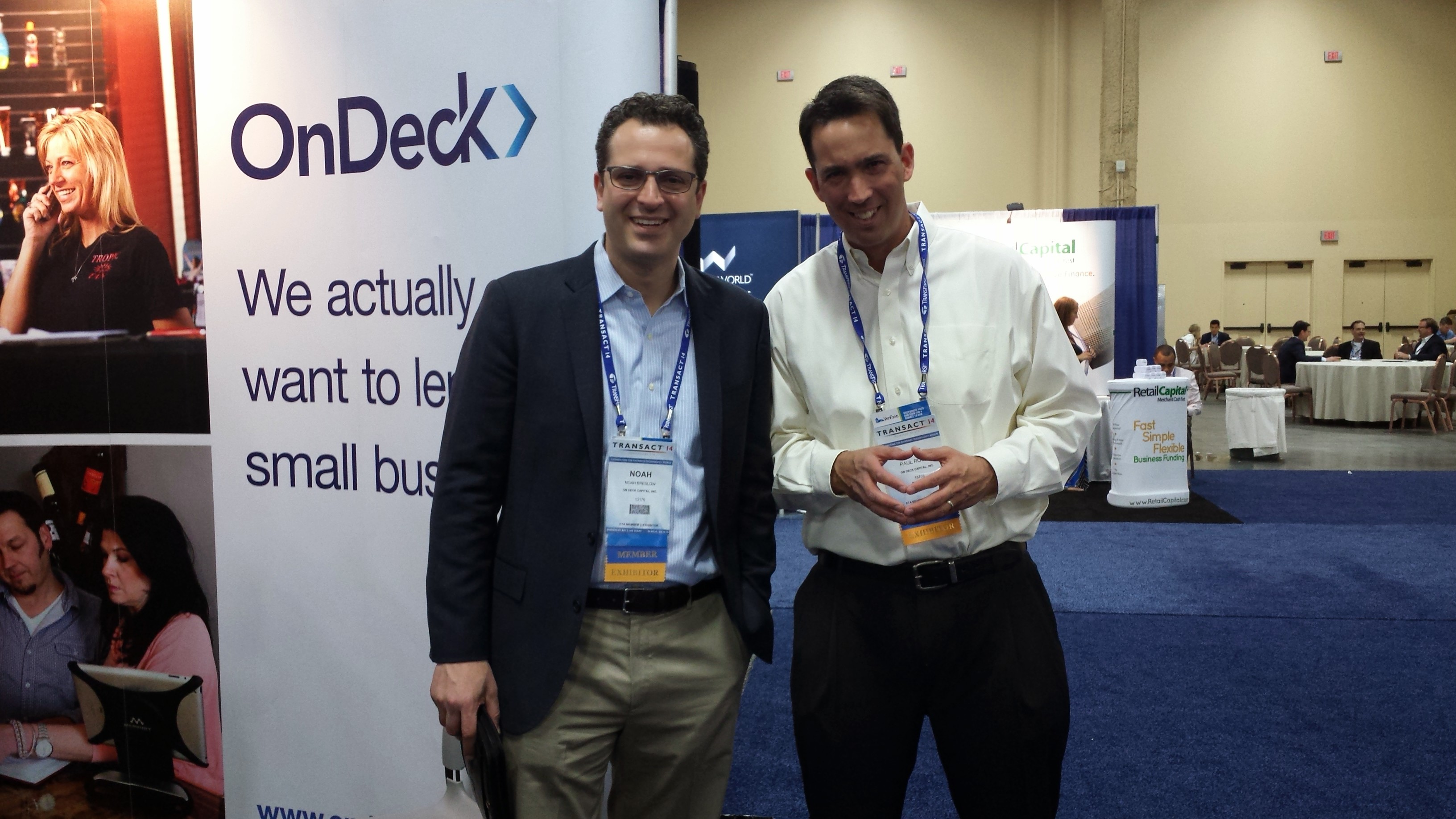Business Lending
Is Jamie Dimon in Favor of Stacking?
March 2, 2016In a featured interview with Bloomberg Markets, JPMorgan Chase CEO Jamie Dimon made a curious argument about small business lending. Speaking about tech-based lenders, Dimon paints the following picture:
For example, they might lend to one of our customers who’s got a $200,000 JPMorgan Chase loan, and this person wants to get another $20,000 for a new truck or a piece of equipment. And what does he do? He goes with them, because he gets it in 15 minutes. If he goes back to the bank, he may have to go through this whole big long process for that $20,000.
Can we do something like that? Of course we can. I’ve asked our people, “Why don’t we just put a revolver on top of our basic loan?” Make it easier for the client.
Whether intentional or not, Dimon’s example is the classic argument made in favor of stacking in the merchant cash advance industry and it’s entirely about doing right by the client. He also said there is nothing mystical about tech-based lenders. “They’re very good at reducing the pain points,” he said. “They can underwrite it quicker using—I’m just going to call it big data, for lack of a better term: ‘Why does it take two weeks? Why can’t you do it in 15 minutes?”’

OnDeck (ONDK) Stock Continues to Sink. Now What?
February 26, 2016OnDeck reached another new all-time low share price on Thursday, closing at $6.35 but hitting $6.05 intraday. The continued spanking follows their 2015 earnings release that apparently did not impress the market. And there’s many reasons to be troubled by that since the tone of the earnings call oozed of renewed confidence. It was expressed as much in OnDeck Regains Their Swagger in Q4 Earnings Call – Lends $1.9 Billion in 2015
OnDeck can’t win. When growth was high, critics complained about profitability. When OnDeck achieved profitability, critics complained that growth had slowed. On Wednesday, critics hit them with the kitchen sink. Growth has slowed, losses are mounting, guidance was revised down, the JPMorgan Chase partnership isn’t yielding revenue, operating expenses rose, etc.
The real problem now is that they can’t seem to overcome these objections during a period of economic calm. The stock market is currently operating at rather rational levels. The S&P 500 is only down 3% year-to-date. OnDeck is down 35% over that same time period.
In a recession, financial companies can be uniquely vulnerable to irrational fear. JPMorgan Chase for example, lost more than 50% of their market cap between August 2008 and February 2009. This is a nightmare scenario now for OnDeck.

“These companies have been valued as if there’s really no credit risk or capital-markets risk whatsoever,” said Bill Ryan, an analyst at Portales Partners, to the WSJ. “I think that’s what changed.”
“We are not seeing weakness in our portfolio at this time,” said OnDeck CEO Noah Breslow during the earnings call.
Apparently that doesn’t matter and one has to wonder what will in the future.
No, Social Media isn’t the New Credit Score
February 25, 2016 The “social media is the new FICO score” crowd suffered a blow on Wednesday when a Wall Street Journal article reported that it ain’t working too good.
The “social media is the new FICO score” crowd suffered a blow on Wednesday when a Wall Street Journal article reported that it ain’t working too good.
Almost 3 years ago, Kabbage co-founder Marc Gorlin told CNN that small businesses who link up their facebook and twitter accounts up with their system, were 20% less likely to be delinquent on their loans. Around that time, Hong Kong-based Lenddo was heralding other positive claims about the value of social media. In the loans they made in Colombia and the Philippines for example, Slate reported that “they scrutinized the applicants’ connections on Facebook and Twitter and that the key to getting a successful loan from Lenddo was having a handful of highly trusted individuals in your social networks.”
For a time, non-bank lenders were saying that social media was the future of credit. That is until it wasn’t.
The WSJ recently reported that lenders are backing away from social media data because it’s becoming harder to tap into and because of the potential regulatory consequences under fair credit laws. Just last month for example, the FTC published a report titled, Big Data, A Tool for Inclusion or Exclusion? In it, the FTC warned that “if a company targets services to consumers who communicate through an application or social media, they may be neglecting populations that are not as tech-savvy.” The implication is that there is potential for unconscious and unintended discrimination of certain minority groups. “Systemic disparate treatment occurs when an entity engages in a pattern or practice of differential treatment on a prohibited basis. In some cases, the unlawful differential treatment could be based on big data analytics.”
But even then, companies like Kabbage have seemingly softened their stance on the value of social media anyway. “Who your social circle is, or whether you play ‘Mafia Wars’—we haven’t seen that as very valuable,” Kabbage CEO Rob Frohwein said to the WSJ.
Facebook is restricting the depth of data available to third parties now anyway. As a result, dozens of startups (not just lenders) that had been using Facebook data have shut down, according to the WSJ.
Lenders like OnDeck might not be surprised by the industry’s sudden realization. Two years ago at LendIt 2014, company CEO Noah Breslow said you have to be careful with the noise of social media as there can be a lot of false signals. And RapidAdvance COO Joe Looney was already telling CNBC three years ago that his company was “not going to make a decision based solely on a string of online comments on a social-media site” even though they would consider the mere presence of an active social-media footprint to be a “good sign.”
It looks like the future of credit scoring isn’t likely to be social media any time soon. All hail the fundamentals.
Loan Brokers: Here’s How to Submit a Deal to a Licensed California Lender
February 24, 2016 Brokers that wish to submit deals to a licensed California lender must also be licensed in the state. This does not apply when the lender is lending via a chartered bank relationship or if the transaction itself is a purchase of future receivables (AKA a traditional merchant cash advance). QuarterSpot for example, recently became a licensed lender (#603-K646) and will be operational to lend in the state starting on March 7th, according to the company.
Brokers that wish to submit deals to a licensed California lender must also be licensed in the state. This does not apply when the lender is lending via a chartered bank relationship or if the transaction itself is a purchase of future receivables (AKA a traditional merchant cash advance). QuarterSpot for example, recently became a licensed lender (#603-K646) and will be operational to lend in the state starting on March 7th, according to the company.
While the process wasn’t easy, they want to make sure that brokers are abiding by the rules as well. To this end, QuarterSpot EVP Mike Green posted a link on the deBanked forum to the licensing form that brokers must complete to apply:
We will require our partners to submit their CFLL License as required by the State. Please send those in ASAP to partners@quarterspot.com
1. Licensing form outlining requirements for licensure – http://www.dbo.ca.gov/forms/Finance_Lenders/DBO_CFLL_1422.pdf
2. Article further explaining legislation – http://www.paulhastings.com/publications-items/details/?id=e867e669-2334-6428-811c-ff00004cbded
In addition to the 31 page application is the payment of a $25,000 Surety Bond. Suffice to say, the process and costs are probably not a good fit for a 2-man upstart loan brokerage with a razor thin budget working out of month-to-month office space. But for a moderately sized operation or bigger, being a licensed broker can potentially be a competitive advantage.
The reason that brokers don’t need to be licensed to send deals to lenders like OnDeck, is because OnDeck operates through a chartered bank relationship and is therefore exempt from licensing requirements. As always, ask an attorney for an opinion if you’re not sure or need help. A broker may be just as culpable for submitting a deal to an unlicensed lender as the lender would be for operating unlicensed.
You can check to see if a lender is licensed at http://www.dbo.ca.gov/fsd/licensees/ but keep in mind that the database is rarely updated (the last time was 2 months ago).
Other helpful information
Can California Lenders Pay Referral Fees to Unlicensed Brokers?
Getting a California Lender’s License
OnDeck Regains Their Swagger in Q4 Earnings Call – Lends $1.9 Billion in 2015
February 23, 2016 OnDeck’s chief executive Noah Breslow and chief financial officer Howard Katzenberg brimmed with confidence in their Q4 earnings call, assuring investors that it’s full steam ahead. After two previous quarters of profitability and getting no love from the market for it, they’re back to doing what they know best, growing.
OnDeck’s chief executive Noah Breslow and chief financial officer Howard Katzenberg brimmed with confidence in their Q4 earnings call, assuring investors that it’s full steam ahead. After two previous quarters of profitability and getting no love from the market for it, they’re back to doing what they know best, growing.
OnDeck loaned a record $557 million in Q4, an increase of 51% year-over-year. Despite market fears of an impending economic downturn, the company is just not seeing signs of the alleged doom in the performance of their loans. “We are not seeing weakness in our portfolio at this time,” Breslow said.
Later in the call they reemphasized that their early warning systems are not setting off any alarms. In fact, they said, origination growth is their main goal in 2016. “We currently believe we can grow annual originations by 45% to 50% in 2016,” Katzenberg said.
OnDeck reminded investors that their unique model is specifically built for economic downturns. Among their strengths are their short duration, pricing spreads and daily payments, they said. Those attributes (which are sometimes criticized by consumer groups today) will serve as the backbone of sustainability if the economy goes south.
Also coming back into the fold are outside brokers, which they refer to as “Funding Advisors.” OnDeck spent a lot of time recertifying those relationships in 2015 and the bulk of the effort associated with that is over, they said. The percentage of loans generated from brokers rose from 18.6% in Q3 to 20.1% in Q4.
They also rebuffed speculation that they were giving up their business model in favor of becoming a bank technology service. While they admitted finding value in the partnerships they’ve formed, particularly with JPMorgan Chase, their core business is and will continue to be lending to small businesses. According to Katzenberg, 2016 will have two key objectives however, “One, launching and refining our pilot program with Chase, and two, continuing to build out our infrastructure to add and support additional partners that understand the small business capital assets problem and are willing to invest in a great customer experience.” They expect to see bank service revenues really begin to scale in 2017 and 2018.
Breslow said in regards to the Chase deal, “Chase will be able to offer almost real-time approvals in the same or next day funding a dramatic improvement over a traditional loan process that might take weeks. Chase will hold the loans, which will be priced like bank products on their balance sheet and OnDeck will earn servicing and platform fees based on volume.”
Their 15+ Day Delinquency ratio was down.
Their partnerships with Minor League Baseball and Barbara Corcoran have been very successful.
They lent $1.9 billion in 2015 across the U.S., Canada, and Australia.
OnDeck Loans Record $557 million in Q4, But Reports $4.6 Million Loss
February 22, 2016 OnDeck funded a record $557 million in Q4 2015, generating $67.6 million in revenue. That came at a cost because they reported a $4.6 million GAAP net loss.
OnDeck funded a record $557 million in Q4 2015, generating $67.6 million in revenue. That came at a cost because they reported a $4.6 million GAAP net loss.
All told however, they loaned $1.9 billion to small businesses in the U.S., Canada and Australia for the full year of 2015.
A record $201.9 million of loans were sold through OnDeck Marketplace® in Q4.
Provision for loan losses during the fourth quarter of 2015 decreased to $20.0 million, down from $20.4 million in the comparable prior year period. The Provision Rate in the fourth quarter of 2015 was 5.6% compared to 6.7% in the comparable prior year period.
OnDeck was up nearly 5% for the day in the hours before earnings were reported. The company has regained some public favor after a partnership with JPMorgan Chase was announced in December. Still, critics have pointed out that the company’s last few positive quarters were dependent on their ability to sell existing loans off their balance sheet to book the necessary revenue to show a profit.
OnDeck has seemingly now returned to their original plan, growth over profits.
In Q3, origination growth had slowed. They reported a profit of $3.7 million on $482 million worth of loans originated. During that quarter, reliance on third party brokers slowed, dipping to 18.6% of their deal flow, but OnDeck CEO Noah Breslow hinted that they may have reached a floor in that ratio. That channel could stabilize and even grow a little bit, he said.
Q4 indeed saw a resurgence to 20.1% from the brokers.
The effectiveness of direct mail marketing was hotly debated in the 2015 Q2 Q&A, but seemed to have relaxed in Q3.
OnDeck’s share price was still down by more than 50% from their IPO, a factor that has potentially contributed to the postponement of other online lending IPOs.
Industry Trade Group Coming of Age: The SBFA is Becoming More Political
February 1, 2016By hiring an executive director, the Small Business Finance Association hopes to achieve at least two goals – taking a step toward becoming a full-service trade group and providing a public voice for the alternative finance industry.
Stephen Denis, formerly deputy staff director of the U.S. House Committee on Small Business, went to work in the new role in mid-December, setting up shop with his cell phone and laptop in a Washington, DC, area coffee emporium. He’s the SBFA’s first full-time employee.
Hiring Denis, who also has association experience, represents “the next evolution” of the trade group, according to David Goldin, SBFA president and Capify’s founder, president and CEO.
 The SBFA, which got its start in 2008 as the North American Merchant Advance Association, changed its name last year because members have added small-business loans to the their merchant cash advance offerings. Although the trade group’s not exactly new, it has plenty of room to grow and its leadership and members seem open to change.
The SBFA, which got its start in 2008 as the North American Merchant Advance Association, changed its name last year because members have added small-business loans to the their merchant cash advance offerings. Although the trade group’s not exactly new, it has plenty of room to grow and its leadership and members seem open to change.
“The goal is to start from scratch and take a look at everything the association is doing,” Denis told deBanked, “and to really build this out to a robust group that represents the interests of small businesses.”
Denis appears optimistic about pursuing that goal. He’s a native of the Boston area and a Harvard University graduate whose first job out of school was as an aide to Republican Sen. John E. Sununu of New Hampshire. After three years in that position, he took a job for two years with a UK-based trade association, traveling frequently to London to inform the group of Congressional action in the United States.
From there, Denis went on to become director of government affairs and economic development for the Cincinnati Business Committee, a regional association that included Fortune 500 companies among its members. After two years in that role, Denis joined the staff of Rep. Steve Chabot, R-Ohio, moving back to Washington and serving as the congressman’s deputy chief of staff during a five-year stint that ended when he joined the SBFA.
While working for Chabot, Denis also became deputy staff director of the House Committee for Small Business, the No. 2 position there, and he has held that job for the last three years. The committee’s tasks include learning as much as they can about small business, including financing, and using the information to advise members of the House on policy initiatives.
The experience Denis has amassed in government should serve the association well because his duties include briefing federal legislators and regulators on how the alternative-finance business works. With Denis as spokesperson, the industry can speak to government with a single voice, Goldin asserted.
“We are going to be aggressive in our outreach to legislators and regulators as well as be active reaching out to local, state governments,” Denis said. The SBFA will “work with other trade groups and small business groups to promote our mission to ensure small businesses have alternative finance options available to them.”

Until now, too many players from the alternative finance industry have been vying for lawmakers’ attention, Goldin said. To make matters worse, some of those seeking to influence government in hearings on Capitol Hill are brokers instead of lenders and thus may not have a perfect understanding of risk and other aspects of the business, he maintained.
“We’re hearing that there are people trying to be the voice of small-business finance that either don’t have a lot of years of experience or they’re not telling the whole story,” Goldin said. “We want to make sure the industry’s represented properly.”
Denis can draw attention away from the “noise” created by unqualified voices and focus on information that Congress needs to make reasonable decisions about the alternative finance business, Goldin maintained.
Besides getting the word out in Washington, the SBFA hopes to convey its message to the general public on “the benefits of alternative financing,” Goldin said. At the same time the group can help make small business owners aware of the finance options, Denis added.
 Asked whether hiring Denis marks the beginning of an effort to lobby members of Congress for legislation the association deems favorable to the industry, Goldin said only that additional announcements will be forthcoming.
Asked whether hiring Denis marks the beginning of an effort to lobby members of Congress for legislation the association deems favorable to the industry, Goldin said only that additional announcements will be forthcoming.
Meanwhile, updated “best practices” guidelines might be in the offing to help industry players navigate the business ethically and efficiently, Goldin said. A set of six best practices the association released in 2011 included clear disclosure of fees, clear disclosure of recourse, sensitivity to a merchants’ cash flow, making sure advances aren’t presented as loans and paying off outstanding balances on previous advances.
Addressing other possible steps in the association’s growth, Goldin said the group doesn’t plan to publish an industry trade magazine or newsletter. However, a trade show or conference might make sense, he noted.
Denis said he and the board had not discussed the possibility of a test, credential or accreditation to certify the expertise of qualified members of the industry. However, associations often establish and monitor such standards, so it would be reasonable for the SBFA to do so, he added.
The association might establish a Washington office, Goldin said. “We’ll look to Steve for his thoughts and guidance on that,” he observed. Denis seems amenable to the idea. “Down the road, we would love to open an office and hire more people,” he said.
In Goldin’s view, all of those moves might help the rest of the world comprehend the industry. Understanding the industry requires taking into account the cost of dealing with risk and business operations, he said.
Placing a $20,000 merchant cash advance, for example, requires a customer-acquisition effort that costs about $3,000 and a write-off of losses and overhead of about $4,000, Goldin said. That’s a total of $27,000 even without the cost of capital, he maintained.
“Most people don’t understand the economics of our business,” Goldin continued. The majority of placements are for less than $25,000, he said, characterizing them as “almost a loss leader when you factor in the acquisition costs.”
While spreading that type of information on the industry’s inner workings, Denis will also conduct the day-to-day for the not-for-profit’s affairs. The association’s board of directors will continue to set policy and objectives.
Members elect the board members to two-year terms. Current board members are Goldin; Jeremy Brown of Rapid Advance, who’s also serving as the group’s vice president; John D’Amico, GRP Funding; Stephen Sheinbaum, Bizfi; and John Snead, Merchants Capital Access.
Member companies include Bizfi, BFS Capital, Capify, Credibly, Elevate Funding, Fora Financial, GRP Funding, Merchant Capital Source, Merchants Capital Access (MCA), Nextwave Funding, NLYH Group LLC, North American Bancard, Principis Capital, Rapid Advance, Strategic Funding Source and Swift Capital.
Companies pay $3,000 in monthly dues, which Denis characterizes as inexpensive for a DC-based trade association.
Membership could spread to other types of businesses, Denis said. “I’d like to expand the tent to other industries,” he noted. “The association is trying to represent the interests of small business and make sure they have every finance option available to them.”
But a key purpose of the trade association is to provide a forum for members to come together as an industry, Denis said. “We’re thinking big,” he admitted. “We hope that all members of the marketplace will want to become a part of it.”
Are Small Business Loans the New Flavor of Fixed Income?
January 26, 2016Brendan Ross, the founder of Direct Lending Investments, the oldest and largest fund that buys small business loans from non-bank lenders, has recently filed an N-2 form with the SEC. If approved, it will make his $450 million fund that is currently only open to accredited investors, open to retail investors. To make that possible, the fund’s structure would be converted so that investors become shareholders in what would essentially be a lending business.
On CNBC, Ross explained his model to Trading Nation’s Dominic Chu. “I buy those loans from the non-bank lenders that make them and make them available in portfolio form,” he said.
Ross added that 85% of his fixed income portfolio is in private credit, but adding that’s because he’s an expert in it. Returns range from 6-14%, much better than fixed income government securities.
When asked if the high yields are due to the risk premium, Ross explained that they’re actually taking advantage of an inefficiency in the market, namely that the premium they’re tapping into is related to banks’ unwillingness and inability to package up short term loans. “Many of our loans are 1 year or less,” Ross said. Banks find it difficult to securitize the type of short term loans that they have in their portfolio, he added.
Watch the discussion on CNBC below:
Or if it’s not loading, visit CNBC’s site here.





























